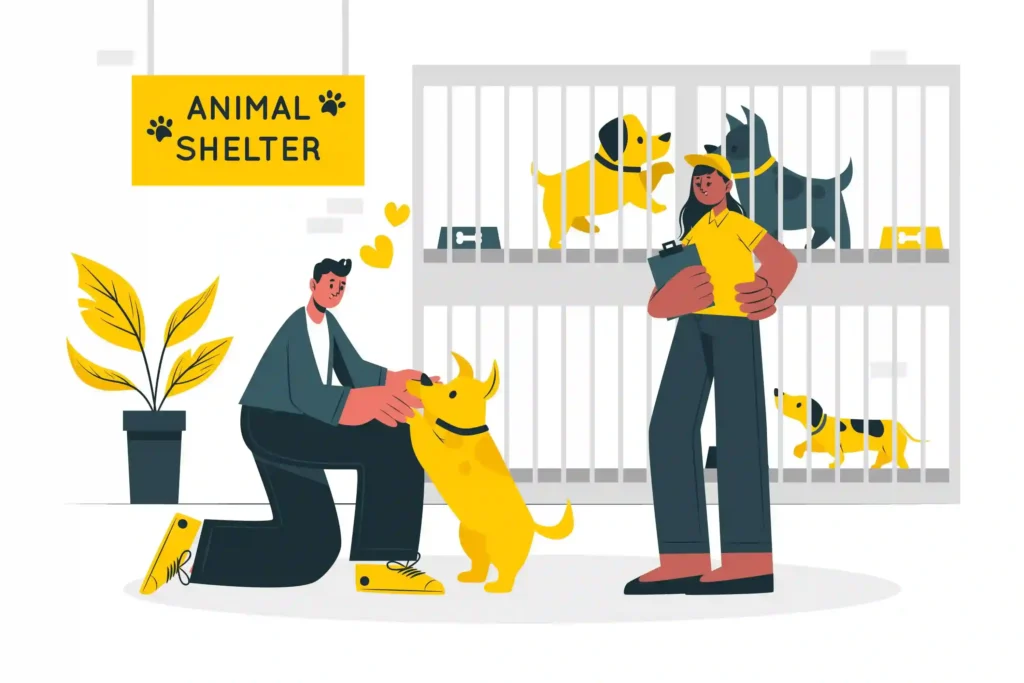Pet adoption is a tremendously enjoyable yet significant endeavor that entails more than just the first thrill of welcoming a furry companion into your house. It represents the beginning of a lifelong commitment that necessitates considerable consideration and meticulous planning. In this comprehensive article, we will look at the ten most important factors to consider before introducing a new pet into your home. These include everything from the specific requirements of the pet breed you’re contemplating to the necessary changes to your living space and daily routine.
Starting the adventure of pet ownership requires a complete awareness of the obligations that come with it. It entails not only showing love and friendship to your new family member, but also ensuring their well-being, health, and happiness. As we progress through these concerns, we will look at the importance of financial planning, committing to regular veterinary care, and devoting time and effort to training and socializing. This two-paragraph advice is intended to provide prospective pet owners with the necessary information to make educated decisions, encouraging a harmonious and rewarding relationship between pets and their human companions.
Research and Select the Right Pet for Your Lifestyle
Choosing the right pet is an important step in creating a positive and rewarding adoption experience. It entails conducting extensive research on several breeds or species to determine the one that best fits your lifestyle, living arrangements, and activity preferences. Whether you’re looking for a loyal canine companion, an independent feline friend, a chirpy bird, or a small and cute mammal, recognizing their specific requirements and features is critical. This informed decision-making process establishes the foundation for a long-term and meaningful commitment between you and your selected pet, building a partnership based on compatibility and shared well-being.
In addition to researching specific breeds or species, it’s vital to consider the long-term commitment involved in pet ownership. Recognizing the time, financial resources, and emotional investment required for the care and well-being of your chosen pet ensures that you are prepared for the responsibilities that come with bringing a new member into your household. By taking a thoughtful and informed approach to pet selection, you not only enhance the chances of a successful adoption but also contribute to creating a loving and nurturing environment where your pet can thrive.
Consider Pet Adoption from a Shelter or Rescue
Adopting shelters or rescue organizations not only provides a compassionate and caring home for a creature in need, but it also helps to solve the widespread issue of pet overpopulation. The option to adopt from these organizations comes with a slew of benefits that go beyond the individual pet-owner relationship. One of the most significant benefits is the act of saving lives since adoption immediately contributes to reducing the number of homeless animals and relieving the load on overcrowded shelters.

Furthermore, adopting from shelters or rescues encourages responsible pet ownership by urging potential pet parents to consider the needs of homeless animals. These organizations frequently give essential information and advice on proper pet care, training, and integration into new households, establishing an environment of informed and conscientious pet guardianship. Furthermore, many shelter pets have already been completely vaccinated and spayed/neutered, giving adopters the convenience of a pet that is not only ready for a loving home but also contributes to the larger effort of population control. Individuals who choose to adopt from shelters or rescues actively participate in a caring solution to the issues that homeless animals confront, which has a beneficial ripple effect in the greater context of animal welfare.
Evaluate Your Financial Preparedness
Pet ownership includes financial obligations such as food, veterinarian care, grooming, and supplies. Effective budgeting is essential for ensuring your pet’s health and maintaining a healthy relationship. A complete budget should include recurring expenses like as high-quality food, veterinary check-ups, immunizations, grooming, and any unexpected fees.
Establishing a pet emergency fund is critical for dealing with unexpected veterinarian expenditures and providing prompt medical care without financial burden. Being financially prepared entails recognizing probable lifetime costs, projecting future expenses, and factoring them into your budget. This proactive approach not only protects your pet’s health, but also builds a stable, joyful relationship, allowing you to provide your pet the love, care, and support they need throughout their lives.
Prepare Your Home for the New Arrival
To ensure a smooth transition for your new pet, create a safe and friendly environment in your house. To accomplish this, try pet-proofing your living spaces by protecting potential risks like toxic plants and electrical lines. Create distinct locations for your pet, such as a nice bed and a separate feeding area. Introduce vital items such as food bowls and make them conveniently accessible. Also, provide a range of toys to keep your pet entertained and stimulated.
For a pet-friendly house, you must anticipate your new companion’s demands. Secure cupboards housing hazardous materials, use pet-friendly cleaning solutions and create a regimen for outdoor breaks. By including these recommendations in your preparations, you not only provide a safe sanctuary for your new pet but also help them adjust to their new surroundings.
Understand the Importance of Training and Socialization
Responsible pet ownership requires proper training and socialization, which are essential for raising a well-behaved and well-adjusted pet. Training has various advantages, including improving communication between you and your pet, establishing boundaries, and cultivating a pleasant bond. Positive reinforcement strategies, like as snacks, praise, and prizes, promote desirable behavior, resulting in a cooperative and responsive pet. Consistency in training increases confidence and minimizes worry, resulting in a more happy household.
Early socialization is equally important for a pet’s entire growth. Introducing a baby pet to a variety of situations, people, and other animals during its formative weeks might help prevent behavioral disorders and fear-related reactions. Socialized pets are more adaptive, confident, and less likely to exhibit stress or hostility in varied situations. In conclusion, devoting time and effort to pet training, using positive reinforcement, and focusing on early socialization are critical components for developing a deep attachment and assuring your furry companion’s well-rounded development.
Commit to Regular Veterinary Care
Regular veterinary appointments are required to ensure your pet’s well-being, which is a key component of responsible pet care. These visits are critical for ensuring good health through vaccines and preventive treatment. Vaccinations protect your pet from potentially fatal diseases, and preventive methods like flea and tick control help keep your companion healthy and happy.
A veterinarian is a key partner in safeguarding your pet’s overall well-being. Beyond treating illnesses, veterinarians guide nutrition, behavior, and tailored care for your specific pet. Regular check-ups allow for early detection of potential health issues, enabling timely intervention and preventing the development of more serious conditions. By prioritizing veterinary visits and preventive care, you actively contribute to the longevity and quality of life of your cherished pet. Incorporating these practices into your pet care routine ensures that your furry friend receives the comprehensive attention and care they need for a healthy and fulfilling life.
Checkout Our Latest Blog Post on “Understanding Dog Health Warning Signs: When to Schedule a Vet Visit“
Provide a Nutritious and Well-Balanced Diet
Nutrition is an important aspect in determining your pet’s health and lifetime. Choosing the proper pet food requires careful consideration of species, breed, age, and dietary requirements. Choose high-quality, balanced foods that are appropriate for your pet’s life stage and health needs. Reading ingredient labels and checking with your veterinarian can help you make more educated decisions.

Understanding your pet’s dietary needs is critical for their overall health. Different animals have different dietary requirements, and variables like as size, activity level, and health status should be considered. Customize their diet to include the nutrients required for optimal growth, energy, and immune system support.
Maintaining a healthy food plan is just as crucial. Establish a regimen that is appropriate for your pet’s age and daily activities, maintaining consistency and preventing overfeeding. To minimize obesity-related health risks, limit your portion sizes. Regularly examine your pet’s nutritional requirements and adapt their food as they age or their health status changes. Prioritizing adequate nutrition and following a smart feeding routine will dramatically improve your pet’s overall health and longevity.
Ensure Adequate Exercise and Mental Stimulation
Understanding and addressing the various activity requirements of different pets is critical for their overall health. Regular physical activity is essential for maintaining a healthy weight, improving cardiovascular health, and avoiding behavioral problems. Customize your pet’s fitness schedule according to their breed, age, and activity level, including activities such as walks, runs, and interactive play.
Equally crucial is to provide cerebral stimulation for your pet. Engage children in activities that stretch their cognitive capacities, such as puzzle toys, interactive games, and training sessions. Mental enrichment is essential for avoiding boredom, anxiety, and negative actions. To keep them interested, rotate toys regularly, and consider activities that appeal to their natural impulses, such as hiding rewards for them to uncover.
Incorporating devoted playtime into your routine deepens your bond with your pet, promoting a pleasant and harmonious relationship. Whether through physical activity or cerebral stimulation, keeping your pet active and engaged improves their overall happiness and health. Use these insights to develop a well-rounded regimen that caters to your companion’s physical and mental demands.
Establish a Reliable Support System
Building a strong support system is critical for pet owners as they negotiate the obstacles of caring for their furry pets. Encourage readers to actively participate in local pet communities, forming friendships with other pet owners. These communities offer an excellent opportunity to share experiences, get advice, and gain insights into effective pet care techniques.
Furthermore, pet owners should seek advice from experienced members of these communities. Experienced pet owners frequently have a lot of knowledge and practical ideas that can be extremely useful, particularly for those new to pet ownership.
Emphasize the necessity of having dependable pet care options in the event of an emergency or unplanned incident. This could entail building contacts with reputable pet sitters, boarding facilities, or veterinary services. Having backup plans in place ensures that pets receive good care even when unforeseen events occur.
Be Prepared for the Long-Term Commitment
Understanding the long-term commitment associated with pet ownership is critical for both prospective and present pet owners. Discuss the typical lifespan of various pets, including dogs, cats, small animals, and birds. Understanding your chosen companion’s probable longevity is critical in preparing for the long-term obligations that come with pet ownership.
Furthermore, emphasizes the formation of an emotional relationship between pet and owner that grows over time. The unique connection developed with a pet grows stronger, adding to the joy and fulfillment of the relationship. This emotional tie is the motivating force behind the dedication to provide unwavering care, love, and support to a pet at all phases of its life.
Conclusion:
In conclusion, adopting a pet is a significant decision that requires careful consideration of various factors. By addressing these 10 crucial considerations, prospective pet owners can ensure a fulfilling and responsible pet ownership experience.


